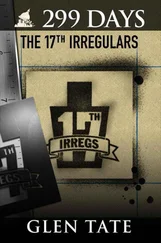Glen Tate - 299 Days - The Preparation
Здесь есть возможность читать онлайн «Glen Tate - 299 Days - The Preparation» весь текст электронной книги совершенно бесплатно (целиком полную версию без сокращений). В некоторых случаях можно слушать аудио, скачать через торрент в формате fb2 и присутствует краткое содержание. Город: Augusta, ME, Год выпуска: 2012, ISBN: 2012, Издательство: PrepperPress, Жанр: sf_postapocalyptic, на английском языке. Описание произведения, (предисловие) а так же отзывы посетителей доступны на портале библиотеки ЛибКат.
- Название:299 Days: The Preparation
- Автор:
- Издательство:PrepperPress
- Жанр:
- Год:2012
- Город:Augusta, ME
- ISBN:978-0615680682
- Рейтинг книги:3 / 5. Голосов: 1
-
Избранное:Добавить в избранное
- Отзывы:
-
Ваша оценка:
- 60
- 1
- 2
- 3
- 4
- 5
299 Days: The Preparation: краткое содержание, описание и аннотация
Предлагаем к чтению аннотацию, описание, краткое содержание или предисловие (зависит от того, что написал сам автор книги «299 Days: The Preparation»). Если вы не нашли необходимую информацию о книге — напишите в комментариях, мы постараемся отыскать её.
299 Days: The Preparation
299 Days: The Preparation — читать онлайн бесплатно полную книгу (весь текст) целиком
Ниже представлен текст книги, разбитый по страницам. Система сохранения места последней прочитанной страницы, позволяет с удобством читать онлайн бесплатно книгу «299 Days: The Preparation», без необходимости каждый раз заново искать на чём Вы остановились. Поставьте закладку, и сможете в любой момент перейти на страницу, на которой закончили чтение.
Интервал:
Закладка:
Nancy Ringman’s phone rang; it was the Governor.
“Yes, Governor,” Nancy said. She listened to the Governor’s short description of the WAB problem.
“I share your concerns about WAB, Governor,” Nancy said. “I will personally look into whether they might be committing any campaign finance violations. A hate group like WAB must be violating some campaign law. I will keep you updated on my progress.”
Nancy put down the phone and felt warm all over. “OK, Grant Matson,” she said to herself. “Payback time.”
Nancy Ringman was a bully. She wore business attire and had a peace sticker on her Subaru, but she was a bully. Grant had been fighting bullies like her his whole life. He would fight them even more in the near future.
A few days later, a process server came to WAB. The Campaign Finance Commission, headed by Nancy Ringman, filed a suit asking for a $10 million fine and scheduled a court hearing for later that same day to get a court order to seize WAB’s bank account. That was necessary, the court papers said, because WAB was a “continuing criminal enterprise” violating the campaign finance laws and using the money in its bank account to do so. CFC needed to have control of WAB’s bank account to “prevent further violations.” After going home to change into a suit, Grant ran off to court and tried to reason with the judge.
The judges in the county where the state capitol was located were friendly toward government. The judge who received the request to seize WAB’s bank account was, like Nancy Ringman, a good friend of the Governor. The judge signed the court order allowing the seizure of the bank account. CFC was ordered to continue paying the salaries of WAB staff unless it found a reason not to. The financial lives of WAB staff were held in the hands of a hostile Nancy Ringman. It happened so quickly.
Ted Foster, the head of WAB, was unfazed. “Well, gentlemen, looks like we have a fight on our hands.” He had halfway expected something like this, given how hard WAB was hitting the government. He was surprised that the bank accounts had been seized, however. “Rebel Radio stays on the air. We fight on.” Ben, Brian, and Grant were relieved.
It felt like a war had begun. Grant had never been in a war, but assumed this was what it felt like. He rallied around his guys. There was a huge and evil threat. Things looked bleak. But Grant knew who would win in the end. Just not how.
Chapter 41
Tough on Crime
The CFC suit and bank account seizure actually wasn’t as bad as WAB thought at first. Their paychecks kept coming. It would take CFC months of gathering all of WAB’s financial records to see that WAB hadn’t done anything wrong. If anything, WAB was overly compliant with the campaign finance laws because they knew something like this might happen. In fact, Nancy Ringman was actually worried that she couldn’t find any violations. The Governor would be pissed.
The Legislature was in session, which was never a good thing. How would they address the budget deficit? Raise taxes, of course. The necessary increases were staggering. A 66% increase of the property tax, a 250% increase of the corporate tax, and a 50% increase in the sales tax. The Governor knew that she must do this to try to bring in money. She also knew that the more she raised taxes, the less business activity there would be, and the less tax revenue. She decided to go down in state history as a “leader” who made “tough choices.” She would do it and not run for another term. Besides, who would want to be Governor with all these messes?
Rick Menlow, that’s who. When Menlow got wind of the Governor’s proposed massive tax hikes, he knew that she could not possibly be attempting to run for another term. And no Democrat could get elected when their party had just raised taxes like that. Menlow knew he would be the next Governor.
Menlow felt a surge of adrenaline. Then he felt… it was hard to describe… a darkness. A happy darkness. He felt like the darkness was saying that he was getting something he wanted, but that the darkness would be back to tell him what he needed to do in return.
The economy was the worst anyone had ever seen. People were scared. It seemed like everyone was out of work. People started to use the “D” word of “depression.” The term “D2,” for Second Great Depression, was starting to be used. Up until this point, everyone on TV had been referring to the economic situation as a “recession.” This wasn’t any little “recession.”
Crime was getting worse. It had grown slowly when the police quit patrolling. Now it was everywhere. Not a complete breakdown of law and order, just rampant crime. It was like Detroit. In fact, people started referring to the slowly unfolding Collapse as the “Detroit- ification” of America.
Amid the virtual bankruptcy of Washington State, the Legislature decided to go to the easy plays from their political play book: crack down on crime. It was far more popular than reducing the size of government spending. Democrats loved “tough on crime” legislation because it helped them get over their 1960s image as being soft on crime. Republicans loved “tough on crime” legislation because… well, they were Republicans. The Governor wanted to appear in control of the whole mess so she could call for tougher and tougher measures.
Of course, increasing prison terms for crimes that were going uninvestigated and unprosecuted wouldn’t do much. Besides, increasing prison sentences would make the state’s financial crisis worse because it meant spending more for prisons. The state was being forced to release prisoners because it couldn’t afford to keep them. So no one, not even the mind numbed zombie voters, would go for increasing prison sentences. The state needed to do something else to show they were cracking down on crime.
The Legislature passed a package of “temporary” laws to make it easy for the police to search people at the new checkpoints and to enter homes without a warrant. The checkpoints were usually a police car or two at a key intersection stopping traffic and asking people for their ID. The police didn’t search every car; they didn’t have the resources for that. The main reasons the ineffective checkpoints were set up were to make citizens feel safe and to show them that the authorities were in charge.
This wasn’t “martial law”; it was an expansion of the powers the civilian police already had. A really big expansion. Most of the voters ate it up. “Something needs to be done,” they said.
The Legislature attempted to pass some strict gun control laws, but didn’t have the votes. People in Washington State, while progressive as a whole, still wanted guns. They saw the packs of punks milling around their neighborhoods. They might tell their progressive friends that they supported gun control, but they were the ones flooding places like Capitol City Guns. That surprised Grant. He figured the state was so far gone that gun control would pass easily, especially in a crime wave. He was glad to be wrong about that.
One small provision of the new “tough on crime” law that went largely unnoticed was a huge expansion of the civil forfeiture law. This law allowed the police to seize (without a warrant) anything of value involved in a crime or suspected crime. For example, if a car were suspected of being used by a criminal, the police could seize it, send the owner listed on the registration a certified letter, wait ten days, and then sell it, and keep the money. That last part was the key.
The police had a profit motive to grab as much stuff as they could; guns, houses, boats. Of course, the overworked police who couldn’t investigate crimes had plenty of time to send out certified mail letters to owners and to sell their bounty. It was a great way to fund police departments without raising taxes. It was also government- sanctioned theft. But it only affected criminals. Right?
Читать дальшеИнтервал:
Закладка:
Похожие книги на «299 Days: The Preparation»
Представляем Вашему вниманию похожие книги на «299 Days: The Preparation» списком для выбора. Мы отобрали схожую по названию и смыслу литературу в надежде предоставить читателям больше вариантов отыскать новые, интересные, ещё непрочитанные произведения.
Обсуждение, отзывы о книге «299 Days: The Preparation» и просто собственные мнения читателей. Оставьте ваши комментарии, напишите, что Вы думаете о произведении, его смысле или главных героях. Укажите что конкретно понравилось, а что нет, и почему Вы так считаете.











